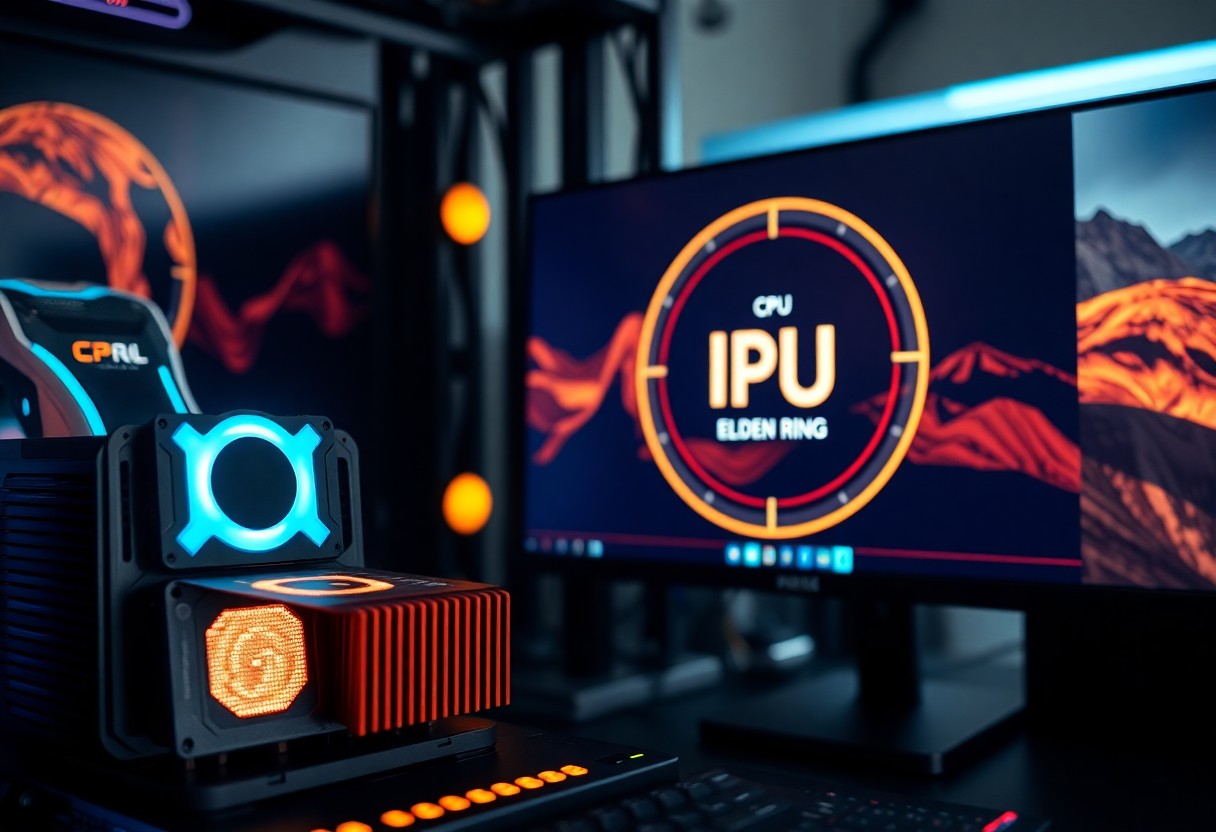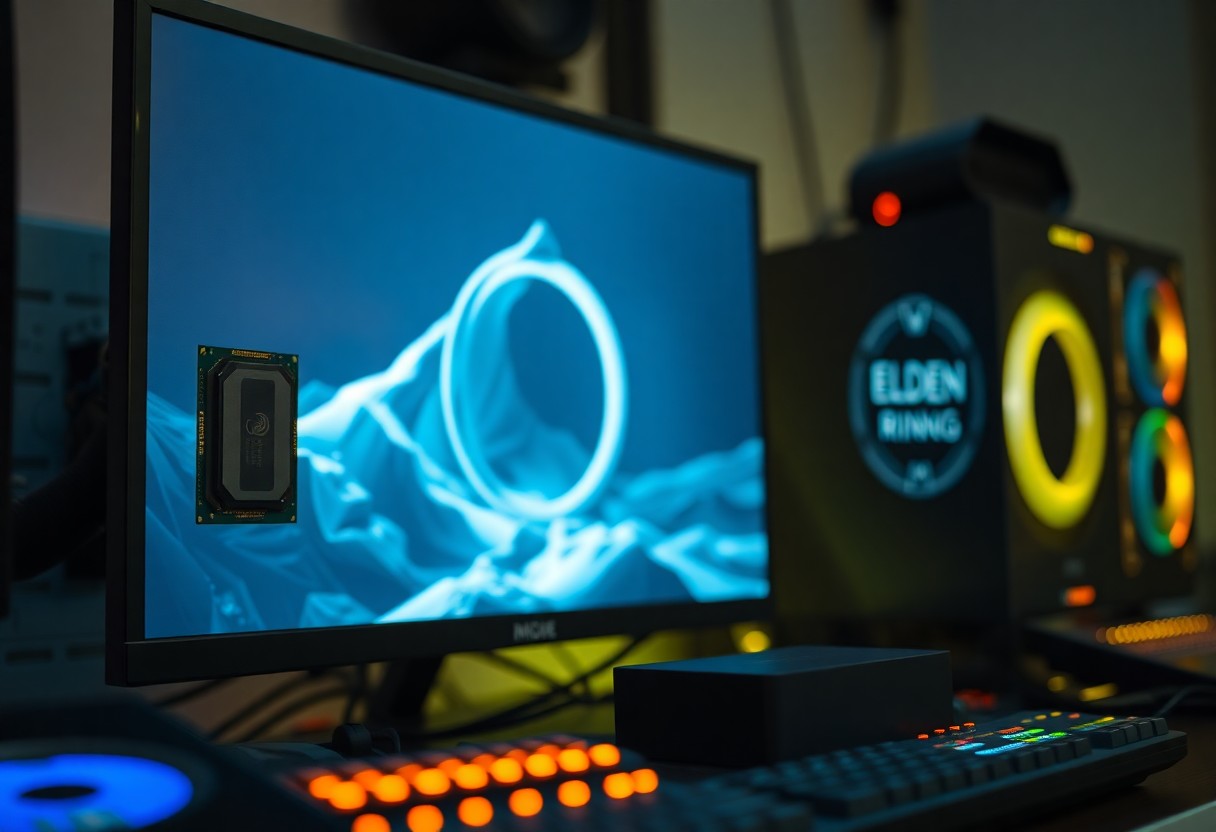PC Bottleneck Calculator
Just understanding the impact of a CPU bottleneck in Elden Ring can significantly enhance your gaming experience. If your CPU is unable to keep pace with your GPU, you may notice framedrops and lag during intense gameplay, leading to an overall frustrating experience. By identifying whether your setup is bottlenecked, you can make informed decisions about hardware upgrades or optimizations that will maximise performance and allow you to fully immerse yourself in the beautifully complex world of Elden Ring.
Key Takeaways:
- Performance Limitations: A CPU bottleneck occurs when the processor is unable to keep up with the demands of the game, resulting in lower frame rates and suboptimal performance.
- Hardware Compatibility: To minimize CPU bottlenecks in Elden Ring, it’s important to have a balanced hardware setup that includes a sufficiently powerful processor alongside an adequate GPU.
- Optimization Settings: Adjusting graphics settings and using performance optimization techniques can help mitigate the effects of CPU bottlenecks while playing Elden Ring.
Understanding CPU Bottlenecks
The performance of your gaming experience is significantly influenced by how well your CPU works with other components. When your CPU reaches its maximum capacity while your GPU is underutilized, it creates a bottleneck, causing potential frame rate drops and stuttering during gameplay.
Definition of CPU Bottleneck
Along with your GPU, the CPU plays a vital role in processing data and executing instructions. A CPU bottleneck occurs when the processor cannot keep up with the demands of the game, limiting your system’s overall performance.
How CPU Bottlenecks Affect Gaming Performance
For gamers, a CPU bottleneck can lead to noticeable issues during gameplay. You may experience lower frame rates, higher latency, and less fluid movement, which can all detract from your gaming experience.
To maximize your gaming performance, it’s important to monitor how your CPU handles different tasks. When a bottleneck occurs, your CPU can hinder your GPU’s full potential, causing frame drops and increasing input lag. Understanding your system’s requirements allows you to make informed upgrades that can enhance overall performance and ensure a smoother gaming experience in demanding titles like Elden Ring.

Identifying CPU Bottlenecks in Elden Ring
While exploring Elden Ring, it’s vital to observe how your CPU handles the game’s demanding environments and intense battles. A CPU bottleneck occurs when your processor struggles to keep up with the game’s graphics and processing requirements, resulting in lower frame rates and lag. By recognizing these signs early, you can take steps to enhance performance and enjoy a smoother gaming experience.
Performance Metrics and Indicators
For spotting a CPU bottleneck in Elden Ring, pay attention to performance metrics such as frame rates, CPU usage percentage, and temperatures. High CPU usage combined with frequent frame drops often indicates that your CPU is unable to handle the game’s demands effectively. Monitoring these metrics closely will help you determine whether an upgrade or optimization is necessary.
Tools for Monitoring CPU Usage
One effective approach to diagnosing CPU bottlenecks is utilizing monitoring tools. These applications allow you to see real-time data on CPU performance, letting you track usage patterns as you play Elden Ring.
Understanding how to use monitoring tools like MSI Afterburner, HWMonitor, or Task Manager, gives you valuable insights into your system’s performance while gaming. These tools display vital information such as CPU usage, temperature, and load. You can quickly identify spikes in usage or overheating, which may impact performance negatively. By maintaining optimal CPU health, you can enhance your user experience and maximize your enjoyment of Elden Ring.
Recommended Hardware for Optimal Performance
Despite the impressive visuals of Elden Ring, achieving optimal performance requires the right hardware. Upgrading your CPU and GPU can significantly enhance your gameplay experience. A well-balanced system will minimize bottlenecks, allowing you to fully appreciate the stunning open world and immersive mechanics. Ensuring you have an adequate RAM capacity is equally important, as it facilitates smooth performance during resource-intensive moments.
Minimum System Requirements
Across the board, Elden Ring demands specific minimum system requirements to run effectively. You will need at least an Intel Core i5 or AMD equivalent, along with 8GB of RAM and a GTX 760 or RX 560 graphics card. Meeting these requirements allows you to experience the game, although performance may be lacking in densely populated areas or during intense battles.
Suggested Upgrades for Better Performance
By focusing on strategic upgrades, you can significantly enhance your experience in Elden Ring. Investing in a better GPU, such as an RTX 3060 or RX 6700 XT, will provide smoother frame rates. Additionally, upgrading your CPU to a higher-tier model can reduce lag during CPU-intensive gameplay moments.
Hence, you should consider these suggested upgrades for better performance in Elden Ring. Consider upgrading to an RTX 3060 or RX 6700 XT for significant improvements in graphics and frame rates. Furthermore, a CPU upgrade such as the Intel Core i7 or AMD Ryzen 7 can greatly enhance your gaming experience by mitigating CPU bottlenecks that can impede performance during complex scenes. Along with increasing your RAM to 16GB or more, you will enjoy a fluid, immersive experience that fully captures the essence of Elden Ring.
Performance Optimization Strategies
Now, improving your gaming experience in Elden Ring requires the right approach to performance optimization. By implementing a combination of adjustments in both in-game settings and system functions, you can significantly reduce CPU bottleneck issues. This will not only enhance your frame rates but also provide a smoother overall gameplay experience.
In-Game Settings Adjustments
Any adjustments you make within the game can lead to improved performance. Lowering graphics settings such as texture details, shadow quality, and anti-aliasing can help reduce the workload on your CPU, making the game run smoother while still providing an enjoyable visual experience.
System Optimization Techniques
After making in-game adjustments, it’s time to turn your attention to system optimization techniques. Ensuring that your operating system is updated, managing background applications, and adjusting power settings can all lead to improved game performance.
For instance, disabling unnecessary background processes can free up CPU resources, allowing Elden Ring to utilize more of your system’s processing power. Additionally, consider overclocking your CPU if your hardware supports it, as this can enhance performance dramatically. It’s also a good idea to ensure adequate cooling to prevent overheating, which can throttle performance. Implementing these strategies can lead to a more stable gaming experience and maximize your enjoyment of Elden Ring.
Impact of CPU Bottlenecks on Elden Ring’s Gameplay
Many players encounter significant challenges when their CPU experiences bottlenecks while playing Elden Ring. These issues can lead to inconsistent performance and hinder your ability to fully enjoy the expansive world and intricate mechanics the game offers. Your character’s responsiveness and the overall fluidity of the game can suffer, disrupting your immersive experience.
Frame Rate and Smoothness
Among the most noticeable effects of a CPU bottleneck is the impact on frame rate and smoothness. You may experience stuttering and sudden drops in frame rates, which can lead to chaotic gameplay during intense battles or exploration. This inconsistency makes it difficult to accurately aim and time your actions, ultimately affecting your performance.
Overall Gaming Experience
Before addressing CPU bottlenecks, consider how they can detrimentally affect your overall gaming experience in Elden Ring. You may find the often highly detailed graphics and immersive environments lose their luster when you’re dogged by performance issues.
Indeed, the overall gaming experience in Elden Ring is significantly diminished by CPU bottlenecks. The game’s rich storytelling and visual allure can feel lackluster when frame rates dip, and the rich auditory landscape may become muddled. You will be frustrated by your inability to fully engage with the world, leading to dissatisfaction. To achieve the best experience, optimizing your system for maximum performance is imperative, allowing you to immerse yourself in the stunning realms and intense challenges that Elden Ring has to offer.
Future Considerations and Trends in Gaming Hardware
Not only is the landscape of gaming hardware continually evolving, but you also need to be aware of the latest advancements that may impact your gaming experience. As CPUs and GPUs become more powerful, you must consider how to avoid potential bottlenecking issues in future titles like Elden Ring. Investing in high-performance components that balance power across your system can significantly enhance performance. Additionally, keeping an eye on trends such as ray tracing and AI optimizations will ensure your setup remains competitive and capable of delivering a seamless gaming experience.
Conclusion
Presently, understanding the concept of CPU bottleneck in Elden Ring is crucial for optimizing your gaming experience. If you notice lower frame rates or stuttering, it may indicate your CPU is struggling to keep up with your GPU. By evaluating your system’s specifications and making necessary adjustments, such as upgrading hardware or optimizing settings, you can significantly enhance your gameplay. Staying informed helps you ensure that you enjoy Elden Ring to its fullest potential.

